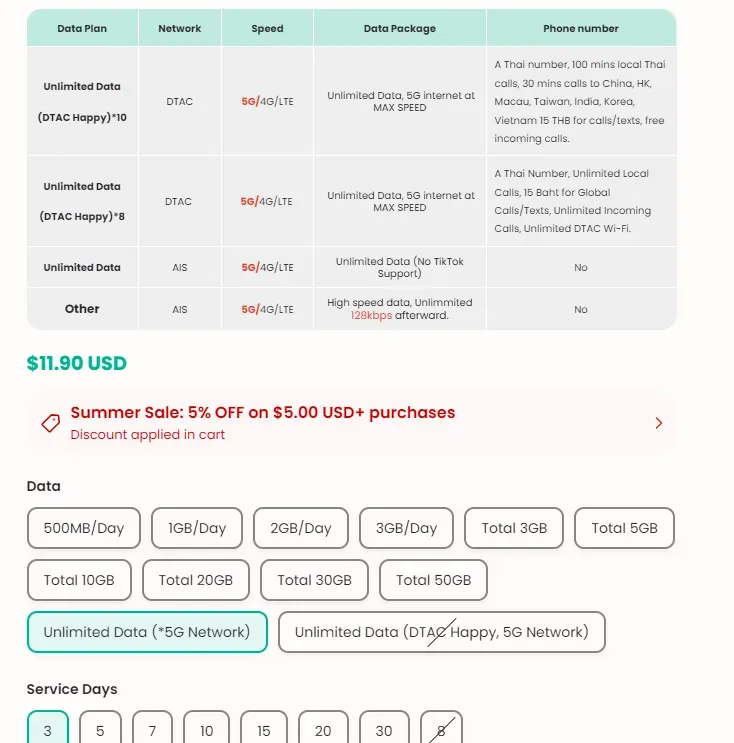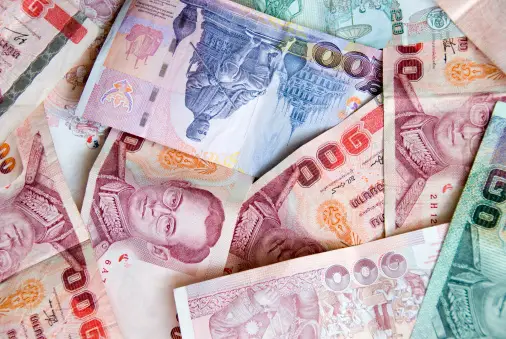Extensive Packing Guide for Thailand Travel
Jul 26,2024 | Snowdust
Planning a trip to Thailand? This vibrant and diverse destination offers everything from bustling cities to serene beaches, lush jungles, and historic temples. To help you make the most of your adventure, we've put together an extensive packing guide tailored specifically for Thailand travel.
Whether you're a seasoned traveler or setting off on your first international journey, our guide will ensure you have everything you need to stay comfortable, prepared, and ready to explore this incredible country. Let's dive in and get packing for an unforgettable Thai adventure!

Essential Documents
There are some essentials you absolutely can't forget, and we're here to make sure you know what they are. Prepare yourself to discover everything about this incredible country!
Visa
In a sense, a visa is not a necessity. The need for a visa is up to your nationality. For instance, Spanish citizens do not need a visa for stays under 30 days. If they decide to extend their stay, they can apply for a permit extension of an additional 30 days.
Remember that if you travel to another country bordering Thailand and then re-enter, you can only stay for 15 days without a visa.
Another key point is to know when to apply for a visa. If you are certain your trip will exceed 30 days, you should visit the nearest Thai consulate or embassy.
Passport
Ensure your passport has at least 6 months of validity remaining and sufficient blank pages for entry and exit stamps (2 pages).
Always carry your passport with you. It’s wise to scan your passport and save it in the cloud or email it to yourself in case of an emergency. Your passport will serve as your legal identification while you’re in the country, so it's crucial to be prepared.

Internet connection
Maintaining a dependable connection throughout your trip is crucial. It allows you to keep in touch with loved ones, share your adventures, use GPS for navigation, and more.
There are numerous ways to access the internet, but not all options are ideal for digital nomads. We will cover the most efficient and easiest ways to stay connected while traveling.
eSIM
If you want to retain your regular phone line while traveling, the eSIM card is an ideal choice. ByteSIM store provides you with an internet connection and unlimited data at 4G/LTE/5G speeds.

Obtaining a virtual SIM card is simple. Begin by confirming whether your phone supports eSIM and remains unlocked. Next, complete your purchase online, and your Thailand eSIM will be sent directly to your registered email. Here are some pros of using an eSIM:
- Get it instantly in your email after purchase.
- Various choices based on your need
- No costly roaming fees
- 24/7 customer service and support
- Check data usage with ByteSIM APP
- Use multiple eSIM plans simultaneously
Other options
There are alternative ways to get internet in Thailand, such as international roaming and pocket Wi-Fi, but they come with drawbacks. You may be familiar with international roaming services, but they tend to be quite costly.
Similarly, pocket Wi-Fi can also be expensive, as it involves fees for device rental, a data plan, and insurance. Additionally, if the device is lost or stolen, you might face extra penalties.
Ultimately, choosing the option that best fits your needs and preferences will allow you to fully enjoy your trip to this amazing country.
Communication
Language plays a crucial role when traveling; therefore, we suggest you equip yourself with a translator. Here are some top translators you might consider:
- Google Translate
- iTranslate
- Ts Translator
- Babylon
If you speak English, you'll likely encounter tourist spots where English is spoken. Nevertheless, having a translator handy is always a good idea.
Money
This is a crucial aspect to consider. You might be asking yourself how much money you'll need and where the best place to exchange it is. To address these questions, take note of the following details.
Thai baht

Thai baht is the official currency of Thailand, which you'll need for payments at local restaurants and businesses. The banknotes of Thai baht are available in denominations of 20, 50, 100, 500, and 1000 baht. Coins are available in 1, 5, 10, 25, and 50 baht denominations. As for satangs, they are equivalent to cents and come in 1, 2, 5, and 10 units.
Tips for currency exchange
- Avoid using your back pockets to store cash, as it is considered disrespectful to the king in Thailand.
- Make sure to check both the exchange rate and any associated commissions.
- Compare more than one online platforms available for currency exchange before making a decision
- Refrain from accepting damaged or worn cash, as it might be problematic when trying to use it for payments.
- Try not to exchange all your money into 1,000-baht bills, as you might face difficulties getting change when shopping at local markets.
Credit card
A bank card can be quite useful, but it might not always be the best choice, as cash is more commonly used in Thailand. Remember that each time you withdraw cash from an ATM, a fee of approximately 5 to 6 euros will be charged per transaction.
However, you can use your card in some hotels and shopping centers, though it may not be accepted everywhere.
Safety
Keeping safety is crucial when traveling, so here are the key factors to consider.
International health insurance
When it comes to health concerns, Thailand offers quality medical services, particularly in Bangkok, though they can be quite costly. Due to the local climate and environment, there's a risk of contracting diseases like dengue or other illnesses from insect bites. It's essential to research and prepare for these potential issues before your trip.
Travel Insurance
Securing travel insurance is highly recommended to cover the aforementioned risks, even if you ultimately don’t need it. When purchasing travel insurance, ensure it covers trip cancellations and medical returns, and verify the coverage limits for lost luggage and other potential problems.
Tips for Travel Insurance
When buying travel insurance for medical expenses, consider these factors:
- Ensure the insurance provides extensive health coverage, given the high cost of medical care in Thailand.
- Choose insurance based on the type of activities you plan to engage in during your trip.
- Confirm that the insurance does not require upfront payments. This way, if you need medical care, you won’t have to pay out of pocket first and then seek reimbursement.
- Opt for a reputable insurance agency and compare the quality and price of their offerings.
- Make sure the insurance includes coverage for trip cancellations, reservation cancellations, and similar scenarios.
First aid kit for Thailand
When packing for Thailand, make sure to include a first-aid kit with essential items. Here's a list of some medications and supplies you should bring:
- Hand sanitizer
- Aloe vera
- Face masks
- Oral rehydration solution
- Antidiarrheal medication
- Ibuprofen
- Antacid
- Mosquito repellent
- Antibiotics
- Antiseptic
- Laxatives
- Bandages, gauze, and adhesive tape
- Sunscreen
- Scissors
- Motion sickness medication
Tailor the kit according to your specific needs. It's advisable to drink only bottled water to avoid stomach issues.
Emergency Contacts
Keep a note of these numbers, either on paper or in your phone, as they could be very helpful in an emergency.
Police:
- Tourist Police Hotline: 1155
- Suvarnabhumi Airport Tourist Police: 02 132 1155
- Don Muang Airport Tourist Police: 02 535 1155
Thailand’s tourism infrastructure is highly efficient, and tourist assistance centers are readily available for support. Here are some essential contact numbers:
- Bangkok Tourist Assistance : 02 356 0650
- Suvarnabhumi Airport Tourist Assistance : 02 134 4077
- Don Muang Airport Tourist Assistance : 083 131 2267
- Chiang Mai Province Tourist Assistance : 081 796 7015
- Chiang Rai Province Tourist Assistance : 053 150 192
Recommended Vaccinations for Thailand
If you have previously traveled to a country where yellow fever is endemic, you must be vaccinated. Some recommended vaccinations for Thailand include:
- Hepatitis A
- Hepatitis B
- Rabies
- Tetanus
- Japanese encephalitis
Clothes
If you're uncertain about what to pack for your trip to Thailand, focus on beachwear, sunny weather, summer attire, and maximum comfort.
Remember that attire for visiting temples differs from what you'd wear to the beach, so here's a breakdown:
Attire for Visiting Temples in Thailand

- Long Pants or Skirt: Choose cool, lightweight fabrics. Opt for loose clothing to minimize the risk of mosquito bites.
- Comfortable Footwear: Select shoes that are easy to slip on and off. If you plan to buy sneakers, ensure they're quick-drying and versatile enough for various activities, including the beach.
- Socks: Consider wearing socks for occasions where you might need to go barefoot, even if you're wearing sandals.
- Shirt with Sleeves: Long sleeves are preferable to cover your shoulders, although some temples may allow a scarf as an alternative.
Beachwear for Thailand
- Shorts: Essential for your beach outings.
- Swimsuits: Pack two or three options.
- Comfortable Sandals or Flip-Flops: Ideal for strolling on the beach.

Accessories and Essentials
- Mosquito Bracelets: Highly effective for protection against mosquitoes. Various options are available on Amazon.
- Sunglasses: The strong Thai sun calls for high-quality sunglasses and good sunblock.
- Universal Power Adapter: Ensure you can charge your devices without issues.
- Power Bank: Choose one with a robust charging capacity and long-lasting battery to keep your devices powered.
- Small Sewing Kit: A needle and thread can be incredibly useful for quick repairs.
- Packing Cubes: These help you organize your suitcase efficiently and are a great investment for future travels.
- Rest Kit: Enhance your travel comfort with a neck pillow, sleep mask, and headphones.
- Folding Bag: Handy for extra storage and flexibility during your trip.
Pack in Hand Luggage
- ID and Documentation: Bring your travel insurance policy, reservations, plane tickets, passport, and other important documents.
- Smartphone and Power Bank: Essential for communication and keeping your devices charged.
- Rest Kit: Includes items like a neck pillow, sleep mask, and headphones for added comfort.
- Money: Keep cash and any necessary cards easily accessible.
Pack in Cabin Suitcase
- Clothing: Pack shorts, Bermuda shorts, a long skirt, long pants, and socks.
- Toiletries and First Aid Kit: Include your essential toiletries and a small first aid kit.
- Chargers and Adapter: Don't forget chargers for your smartphone, laptop, iPad, and a universal power adapter.
- Camera and Computer: If you plan to bring these, ensure they are packed in your cabin suitcase for easy access.
---> You may be interested in top travel destinations in August.



